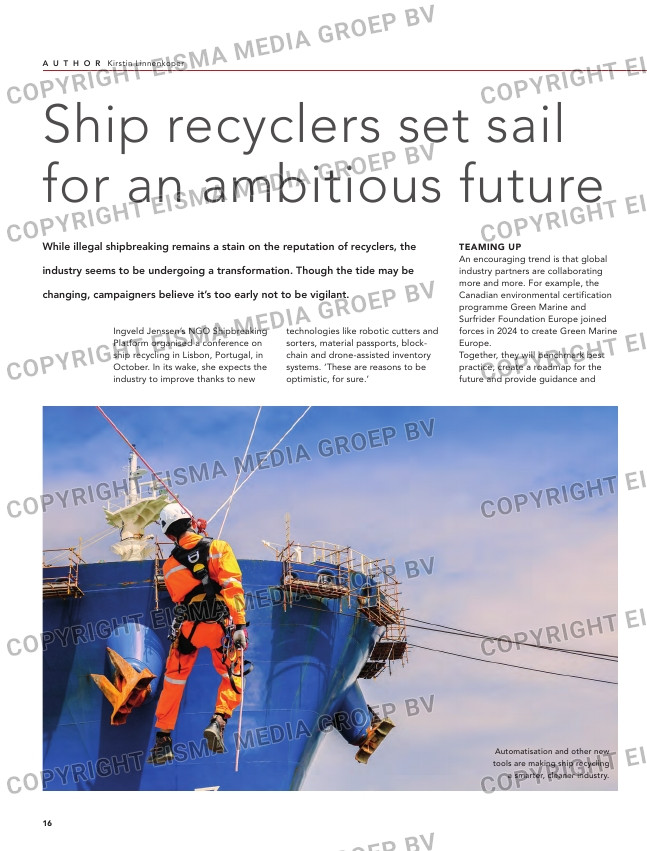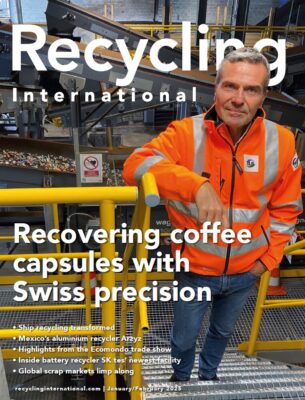Page 16 from: Recycling International Jan/Feb 2025

16
Ship recyclers set sail
for an ambitious future
While illegal shipbreaking remains a stain on the reputation of recyclers, the
industry seems to be undergoing a transformation. Though the tide may be
changing, campaigners believe it’s too early not to be vigilant.
smart tools to measure progress. The
non-profit currently has 30 members
in Europe and 187 across North
America, including Stena Line.
The network of EU-approved ship
recycling facilities is also growing and
now numbers 48. While Germany is
an important manufacturing hub, it
still lacks an approved site, laments
Daniela Köster of international con-
sulting firm EurA. German businesses
and institutes, however, are eager to
exchange technical expertise with
international stakeholders via the new
recycling network ShipRec.
‘We are working on enhancing the
automatisation of the ship recycling
process, especially using sorting inno-
vations,’ Köster told delegates. ‘Some
of our researchers have also intro-
duced a digital twin system to keep
track of the entire scrap flow.’
ALTERA FINALLY PAYS UP
‘Sadly, there are still plenty of compa-
nies that put profit over people, and
over the environment,’ Jenssen
asserts. She hints at a legal case than
dragged on for five years. It concerns
Altera Infrastructure, which has now
agreed to pay EUR 695 500 for ille-
gally scrapping vessels in India in
2020. In doing so, the Norwegian
ship management company has
avoided a trial.
It concerns the dismantling of two
shuttle tankers, the Navion Britannia
and the Alexita Spirit, at the Alang
shipbreaking yard. A trial was sched-
uled for January after Altera contest-
ed the fine imposed by Økokrim,
Norway’s National Authority for
Investigation and Prosecution of
Economic and Environmental Crime.
However, it has now chosen to pay
the penalty.
HIGH PRICE, HIGH RISKS
NGO Shipbreaking Platform wel-
comed the fine and hoped it would
prompt Altera and other operators to
change their ‘money-first’ approach
to scrapping. It laments that, despite
EU rules prohibiting the export of
end-of-life ships from EU waters to
non-OECD countries, it remains a
common practice.
Ingveld Jenssen’s NGO Shipbreaking
Platform organised a conference on
ship recycling in Lisbon, Portugal, in
October. In its wake, she expects the
industry to improve thanks to new
technologies like robotic cutters and
sorters, material passports, block-
chain and drone-assisted inventory
systems. ‘These are reasons to be
optimistic, for sure.’
TEAMING UP
An encouraging trend is that global
industry partners are collaborating
more and more. For example, the
Canadian environmental certification
programme Green Marine and
Surfrider Foundation Europe joined
forces in 2024 to create Green Marine
Europe.
Together, they will benchmark best
practice, create a roadmap for the
future and provide guidance and
A U T H O R Kirstin Linnenkoper
Automatisation and other new
tools are making ship recycling
a smarter, cleaner industry.
16-17-18-19_shiprecycling.indd 16 29-01-2025 11:22



